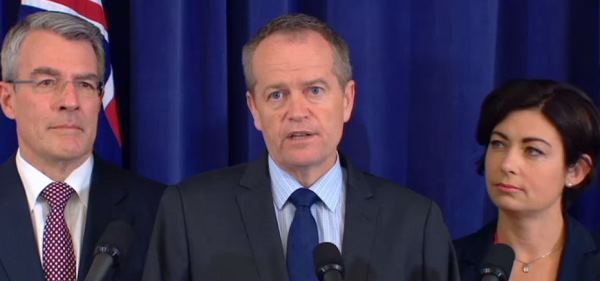Confirming what has been expected for weeks, Labor has announced it would indeed vote against the legislation that would enable a plebiscite on marriage equality.
MPs and senators gathered for a meeting in Parliament House yesterday morning and unanimously agreed they would vote to block the bill. The Federal Government’s highly-criticised plan to bring the vote to the Australian people (set to take place in February next year and cost $160 million) is now null and void.
Speaking at a press conference after the meeting, Opposition leader Bill Shorten, together with shadow attorney-general Mark Dreyfus and marriage equality spokeswoman and member for Griffith Terri Butler, stood together to outline the reasons they would block the plebiscite bill on marriage equality.
Mr Shorten, who has spoken to many LGBTI people said, “Having met these families, having listened to their stories, I could not in good conscience recommend to the Labor Party that we support the plebiscite about marriage equality.
“The Labor Party, therefore, will in Parliament oppose Malcolm Turnbull’s expensive, divisive plebiscite,” he said.
A ReachTel poll conducted last Thursday on behalf of Australian Marriage Equality, found that 46.2 per cent of the 3000 people polled think it’s ‘very important’ that the issue is resolved swiftly on the floor of Parliament, while 19.5 per cent believe it is ‘somewhat important’ and 34.3 per cent think it is ‘not at all important’.
Along with Labor, the Greens and several Senate cross-benchers also promised to vote against the bill. Their actions will make it impossible for the legislation to pass Parliament.
Mr Shorten still believes holding a free-vote in Parliament this year is the best way to decide on marriage equality.
Read more at abc.net.au
Read more at smh.com.au
Opinion: Redundant, costly vote rejected
Ever since Malcolm Turnbull’s government announced the same-sex marriage plebiscite, numerous political figures, advocacy groups and even celebrities have spoken out against it. In September, comedian and author Magda Szubanski incited a rousing furore when she damned the action on Q&A.
Throughout it all, surveys and polls reflected that the majority of public opinion was firmly set against the plebiscite. An opinion poll published in September showed that 62 per cent of respondents supported same-sex marriage but only 39 per cent thought a plebiscite was a good idea.
Labor was openly against the bill from the moment it was announced, but came to a decision after consulting with LBGTI advocacy groups and mental health experts. At one point, Mr Shorten even suggested the possibility that a public vote on same-sex marriage could lead susceptible people to suicide.
He wouldn’t be too far off, either. In Ireland, where same-sex marriage has been legal since 2015, a survey that looked into the emotional and psychological effects of the May 2015 referendum found surprising results. The online anonymous survey, conducted by the University of Queensland and University of Victoria, surveyed more than 1600 people involved the referendum and found that only 23 per cent of people who took part in Ireland’s ‘Yes’ campaign said they would go through it all again. Nearly three-quarters of people surveyed believed the ‘No’ campaign, driving against allowing marriage equality, had a “highly detrimental impact on young LGBTI people and the children of LGBTI parents”.
When an issue such as same-sex marriage is pushed into the limelight, the politics of it can often overshadow the human aspect that should actually be at its centre. For too long the same-sex marriage issue has been usurped for political gain and by those not directly affected. Labor’s decision to block the plebiscite has stopped a redundant, costly public vote from occurring.
Australians are calling for swift action on this change to legislation and they’re being heard. Marriage equality will happen. This has simply put us one step closer.
Related articles:
Same-sex marriage a ‘certainty’
Shorten speaks up for equality
Ireland votes for gay marriage

